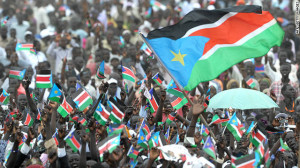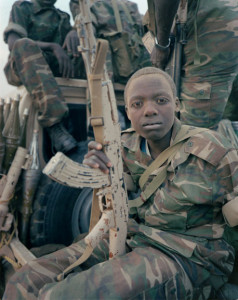 I joined the chorus of those heralding the birth of South Sudan as a new nation in Africa – fathered not by colonial masters but by Africans themselves. But I felt constrained to sound this cautionary note:
I joined the chorus of those heralding the birth of South Sudan as a new nation in Africa – fathered not by colonial masters but by Africans themselves. But I felt constrained to sound this cautionary note:
What looms, however, may cause the southerners’ Independence Day, which they will mark on July 9, to turn into a pyrrhic celebration…
I just hope and pray these southerners – who are composed of all kinds of Black tribes – can avoid the kind of tribal conflicts that continue to beset so many other countries in Africa.
(“South Sudan Secedes,” The iPINIONS Journal, February 9, 2011)
Sure enough, their celebration was pyrrhic. Because here I am, less than three years later, feeling obliged to comment on South Sudanese cannibalizing each other:
South Sudan’s army fought on Sunday with ‘White Army’ ethnic militia, accusing rebels of mobilizing the force despite its offer of a truce to end the conflict in the new country.
Two weeks of fighting have left at least 1,000 dead and split the oil-producing country barely two years after it won independence from Sudan. It has also raised fears of an all-out civil war between the main Dinka and Nuer ethnic groups which could destabilize fragile East Africa.
(Reuters, December 29, 2013)
 Clearly there’s farcical irony (or is that tragicomedy?) in calling a bunch of Black militiamen – who cover their faces with ash as insect repellant – a “White Army.” Given their look and haunting tactics, one would’ve thought “ghost army” would be more fitting. But I shall leave it to experts to comment on the socio-psychological legacy of colonialism their curious appellation reinforces.
Clearly there’s farcical irony (or is that tragicomedy?) in calling a bunch of Black militiamen – who cover their faces with ash as insect repellant – a “White Army.” Given their look and haunting tactics, one would’ve thought “ghost army” would be more fitting. But I shall leave it to experts to comment on the socio-psychological legacy of colonialism their curious appellation reinforces.
Instead, I shall suffice to bemoan this prescient/foreboding lament I sounded six years ago (in “Politics of Corruption in Kenya,” The iPINIONS Journal, December 31, 2007) when Kenya was on the precipice on a similar tribal/ethnic conflict:
This sets up the all-too-familiar prospect of Africans resorting to tribal warfare to settle their political disputes… And those of us who are still hoping against hope for a political awakening in Africa cannot help but look on in despair as Kenya … descends back into the heart of darkness – where bloodlust gives rise to Idi Amins and Rwandan genocides.
Except, to be fair, I should note that South Sudanese President Salva Kiir, with his government troops comprised mostly of Dinka tribesmen, and sacked deputy president Riek Machar, with his rebel forces comprised mostly of Nuer tribesman, have dispatched delegations to peace talks in Ethiopia. But nothing indicates how fated those talks are to fail quite like both men also deploying more troops to escalate their civil conflict.
In fact, the most noteworthy thing about this Ethiopian peace initiative is the lead role Kenyan President Uhuru Kenyatta is playing. For, ironically and perhaps instructively, prosecutors in The Hague have been trying for months to extradite him to face trial for crimes against humanity that were committed during Kenya’s tribal/ethnic conflict six years ago.
But:
I am willing to bet my life savings that President-elect Uhuru Kenyatta will never set foot in The Hague; and, if convicted in absentia, he will never serve a day in jail. Honestly, all things considered, who could blame him if he proceeded now to use his position as president, as well as prevailing anti-ICC sentiment throughout Africa, to shield himself from arrest?
(“No (Equitable) Justice in ICC Prosecuting Kenya’s Kenyatta,” The iPINIONS Journal, March 25, 2013)
Indeed, it’s just another indication of how determined African leaders are to reject The Hague’s jurisdiction over them that they are all heralding and supporting the “indispensable” role Kenyatta has assumed – to bring peace to South Sudan even if it takes deploying Kenyan troops.
In the meantime, the death toll rises, and almost one million people have been displaced since fighting erupted last month.
God help South Sudan. God help Africa….
Related commentaries:
Birth of South Sudan….